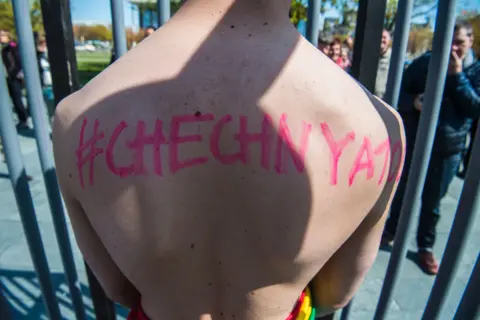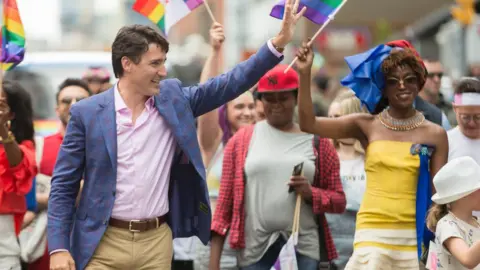Canada has quietly granted asylum to LGBT Chechens
 AFP
AFPThirty-one gay and bisexual Chechen men and women have been granted asylum in Canada following a violent crackdown on LGBT people in the Russian republic. They are being brought to Canada as part of an under-the-radar collaboration between human rights groups and the federal government.
In April, reports of abductions, detentions, disappearances, torture and deaths targeting gay and bisexual men in Chechnya began making international headlines.
The Chechen government denied that security officials had launched an anti-gay purge, saying that gay men "simply don't exist in the republic".
It was a claim repeated in July by authoritarian Chechen leader Ramzan Kadyrov, who denied in an interview there were gay men in Chechnya.
He then told HBO reporter David Scott : "If there are any, take them to Canada".
Rainbow Road executive director Kimahli Powell says "I had to chuckle when I heard that".
By that time Rainbow Road, a non-governmental organisation (NGO) that helps LGBT people escape persecution and violence around the world, was well into a clandestine effort to spirit gay and lesbian Chechens to Canada.
The programme was kept secret until last week in order to assure the security of those they were assisting.
Its full details remain vague and the Canadian government has only confirmed its role through unnamed sources.
Powell confirmed that 31 people have been granted asylum in Canada since June and that 22 are now in the country. They are all young, between 20 and 25 years old. Most were brought to Canada as government-assisted refugees.
Rainbow Railroad, based in Toronto, has also helped move another four to other countries.
All told, about 70 gay and bisexual men and women have escaped Chechnya, though a number still remain in Russia.
In May, the Russian LGBT Network said it was working with five countries in Europe and elsewhere to offer asylum to dozens of gay men.
But the organisation only named one country - Lithuania - as a confirmed destination.
Powell says when the scope of the persecution in Chechnya became clear, it made sense to approach the federal government for help.
 AFP
AFPPrime Minister Justin Trudeau publicly supports LGBT rights and regularly attends pride parades across the country. He named Liberal MP Randy Boissonnault as special adviser on LGBT issues.
Trudeau and Foreign Affairs Minister Chrystia Freeland had both publicly condemned the anti-gay purge and called the persecution "reprehensible".
Rainbow Railroad was also concerned that Europe, with its Chechen diaspora, might not be the safest place for the refugees.
Powell says "this was a time to see whether the government was really going to do something".
Rainbow Railroad worked closely with the Russian LGBT network - the key organisation in the region - to help get the men and women out of Chechnya.
"In February, they're young individuals who had never left home, closeted, and all of a sudden captured, rounded up, beaten, abused, outed and then forced to migrate, within a few months," Powell says.
"Even in Canada they don't believe they're safe."
Human Rights Watch was also instrumental in the effort.
Egale, a Canadian LGBT human rights organisation, is working with 16 of the Chechens who have safely settled in Toronto.
The individuals will get counselling and settlement services.
Executive director Helen Kennedy says they face the usual challenges common to refugees - integrating into a new country and culture with different customs and language - as well as the trauma related to their experience.
She says the LGBT groups supporting the newcomers will need resources to help them adapt.
Gay men and lesbians who have faced persecution in other countries often distrust groups that provide services that aren't focused on the LGBT community.
"They should not feel abandoned once they get here," she says.
It's possible Canada's involvement will increase tensions between Canada and Russia.
The Globe and Mail newspaper reported that Freeland played a key role in the operation. Freeland is also one of 13 Canadian officials sanctioned by Moscow in 2014 in retaliation for sanctions imposed over Russia's annexation of Crimea.
Russian officials told the Globe that there would be consequences if Canada violated Russian law by bringing in the Chechen refugees.
It's not the first time Canada has helped persecuted gay men and lesbians.
The previous Conservative government helped LGBT people fleeing persecution from Iran, though the number being granted asylum in Canada dropped as Liberal government shifted its priorities to bringing in Syrian refugees in 2015.
